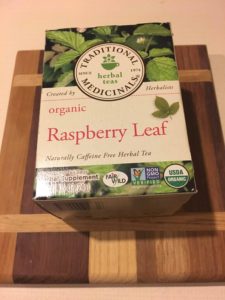If you’re a mama or an aspiring mama, you’ve no doubt heard the hype around red raspberry leaf tea. Supposedly it has all kinds of health benefits for women, including improving fertility and making labor easier. To hear some midwives describe it, this tea is up there with kale and quinoa in terms of superpowers!
Should women hoping to get pregnant drink red raspberry leaf tea? While there is plenty of anecdotal evidence, scientific studies have not proven that drinking red raspberry leaf tea has significant health benefits for fertility or pregnancy.
Drinking tea is pretty harmless, though — even if it doesn’t do much, it’s unlikely to hurt you. (At the worst, it might make you pee. But pregnant women pee all the time anyway, so…)
It may even have a placebo effect, making you you feel like you’re doing something proactive to prepare your body for pregnancy, and, later, labor.
What Is Red Raspberry Leaf Tea?
First of all, let’s be clear about what red raspberry tea actually is. Red raspberry leaf tea is made from the dried leaves of the red raspberry bush. It’s not “regular” tea with raspberry flavoring added. Like all herbal teas, it’s naturally caffeine-free.
So what does it taste like? Red raspberry leaf tea doesn’t taste like raspberries. As herbal teas go, it has a pretty mild taste. I don’t like strong herbal teas that make me think I’m drinking potpourri, and I didn’t mind red raspberry leaf tea at all.
But if you’re not a fan, experiment with drinking it cold or adding honey. If you really hate the taste of the tea, you can try taking red raspberry leaf capsules instead.
What Is Red Raspberry Leaf Tea Supposed to Do?
Red raspberry leaf may seem like a new craze among the crunchy mamas of the internet, but Europeans and Native Americans have used it as an herbal remedy for centuries. It’s actually known as “the women’s herb.” The tea is believed to:
- Relieve cramps and other PMS symptoms
- Regulate menstrual cycles
- Support implantation by strengthening the uterine wall
- Relieve nausea and other morning sickness symptoms
- Strengthen the uterus to prepare for childbirth (the idea is that toned muscles = more effective contractions = faster childbirth with fewer interventions)
- Help the uterus recover from childbirth and reduce hemorrhaging
- Increase milk production
How can red raspberry leaf tea do all this? The leaves of the red raspberry plant are full of important vitamins and minerals, including Vitamin A, Vitamin C, Vitamin E, iron, calcium, magnesium, manganese, and potassium.
To increase the concentration of these nutrients, you can use red raspberry leaf to make an herbal infusion rather than just a tea. An infusion involves steeping a large quantity of the loose tea for a longer amount of time (usually four hours or more). This will also make the taste stronger.
Is There Any Evidence That Red Raspberry Leaf Tea Has Any Real Health Benefits for Women?
Many of the women who swear by this tea say it helped them get pregnant or have a smooth, easy birth experience. But did the tea have any real effect, or was it just a coincidence?
Pregnant Scientist did a review of the scientific literature on the benefits of red raspberry leaf tea, and she was not convinced the tea has any significant effect. For example, one study found that women who drank the tea were able to shorten their labor by only a few minutes, which is hardly a game-changer.
It is also worth pointing out that most of the studies were done on pregnant rats, so the results are not necessarily applicable to humans. For obvious ethical reasons, experimenting on pregnant women can get dicey.
That’s the same reason it’s hard to know whether fertility drugs are 100% safe for lactating women, as I explain in my post Breastfeeding While TTC: What You Need to Know.
But the Pregnant Scientist said that she was drinking the tea anyway, so…
When Should You Start Drinking Red Raspberry Leaf Tea?
If you’re not pregnant, you can start drinking red raspberry tea any ol’ time. Start with a cup a day and see what you think!
It’s often recommended that pregnant women wait until their third trimester to start drinking red raspberry leaf tea, especially if they are planning to drink large quantities of it every day.
The concern is that the tea could stimulate the uterus to such an extent that it brings on premature labor. Whether that fear is well-founded or not is up for debate.
Many women have had no problem drinking it throughout pregnancy, as a way to relieve morning sickness or simply relax. Also, having a nice cup of tea during the two-week wait may help your mind off symptom-spotting in the two-week wait. It’s better than Googling “early pregnancy symptoms” 10 times a day! (But if you still want to obsess, feel free to check out my post Symptom Spotting: How to Tell a BFP from PMS.)
As always, it is best to consult your medical provider before taking any supplements, especially if you are pregnant or planning to become pregnant. I am not a doctor and this post should not be taken as medical advice.
My Experience With Red Raspberry Leaf Tea
I hadn’t heard of red raspberry leaf tea until I was pregnant, so I can’t say if it did anything for me in terms of fertility. I started drinking a cup a day in the third trimester.
Did it do anything to help me with labor? I honestly have no idea. I had quite a lot of medical interventions during labor and delivery, which isn’t terribly surprising given the fact that I was having twins. But I do think the tea had worthwhile psychological benefits.
My due date was in February and I live in a snowy area, so sipping tea in the evenings was warm and comforting. Also, I spent the last month of my pregnancy expecting to go into labor at any point, because twins are usually born early. Once all the nursery stuff is set up, it’s hard to know how exactly you’re supposed to prepare for your first baby (or babies).
It was nice to have something concrete I could do to get ready for this life-changing event, even if it was just drinking tea.
My husband even started calling it my “lady tea,” as in, “Do you want me to bring you some of your lady tea?” When you’re 38 weeks pregnant with twins, you are not making a lot of unnecessary trips around the house!
Side note about magnesium: I did take magnesium when I was pregnant (in addition to my prenatal vitamins), and for me it was a miracle cure for leg cramps. I literally got leg cramps every night until i started talking magnesium, and then I got zero. So it makes complete sense that tea containing magnesium would help with leg cramps in pregnancy.
 The Bottom Line
The Bottom Line
For now, it looks like red raspberry leaf tea MIGHT have some benefits for women who are trying to conceive, as well as women who are already pregnant and women who are nursing. But more research is definitely needed.
If you decide to try red raspberry leaf tea, it shouldn’t be hard to find at your local supermarket or health food store. Again, just make sure you are buying red raspberry leaf tea and not raspberry-flavored black tea.
I ordered this brand from Amazon (affiliate link) because I didn’t love waddling around supermarkets super pregnant. This tea is one of the essentials featured in my Infertility Starter Pack.
This post was last updated in May 2020.




 I’m Jenn! Here I am with my beautiful twin boys. My pregnancy was possible thanks to fertility treatment for PCOS.
I’m Jenn! Here I am with my beautiful twin boys. My pregnancy was possible thanks to fertility treatment for PCOS.


